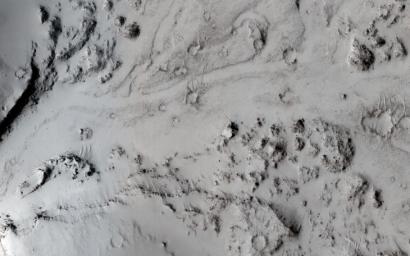
|
Breaching a Crater Rim in Tartarus Montes
- Click the image above for a larger view
- Full-Res JPEG (2880 x 1800) (538.9 kB)
- Full-Res TIFF (2880 x 1800) (15.6 MB)
Caption:
In this image, we can see a small notch in a crater rim with a well-formed channel. Lava appears to have flowed through this notch and filled in this approximately 10-kilometer (6-mile) diameter crater.
Obtaining another image of the same area at a different angle (what we then call a "stereo pair") can help us see this terrain in three dimensions and answer some questions about what happened here, e.g., is the high-lava mark consistent with the lava overtopping the exterior? Did the crater fill to the level of the lava outside?
Background Info:
HiRISE is one of six instruments on NASA's Mars Reconnaissance Orbiter. The University of Arizona, Tucson, operates the orbiter's HiRISE camera, which was built by Ball Aerospace & Technologies Corp., Boulder, Colo. NASA's Jet Propulsion Laboratory, a division of the California Institute of Technology in Pasadena, manages the Mars Reconnaissance Orbiter Project for the NASA Science Mission Directorate, Washington.
Cataloging Keywords:
| Name | Value | Additional Values |
|---|---|---|
| Target | Mars | |
| System | ||
| Target Type | Planet | |
| Mission | Mars Reconnaissance Orbiter (MRO) | |
| Instrument Host | Mars Reconnaissance Orbiter | |
| Host Type | Orbiter | |
| Instrument | High Resolution Imaging Science Experiment (HiRISE) | |
| Detector | ||
| Extra Keywords | Color, Crater, Mountain | |
| Acquisition Date | ||
| Release Date | 2013-08-28 | |
| Date in Caption | ||
| Image Credit | NASA/JPL-Caltech/Univ. of Arizona | |
| Source | photojournal.jpl.nasa.gov/catalog/PIA17645 | |
| Identifier | PIA17645 | |
